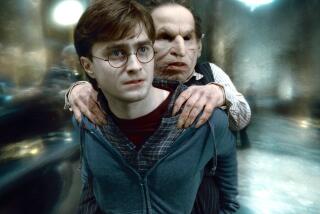An activism spell
- Share via
For some people the Harry Potter books made for good beach reading, but for others they inspired a call to social activism. Andrew Slack, the 29-year-old director of the nonprofit Harry Potter Alliance, sits firmly in the second camp.
A self-declared “Harry Potter rabbi” who quotes from the series about the young wizard as a clergyman might quote Scripture, Slack’s organization uses parallels from the Potter books to educate and mobilize Potter fans around such issues as workers’ rights and combating genocide.
Slack started the group in 2005 and since has used his online connections to reach a rabid Potter fan base that numbers in the millions. His group’s accomplishments include registering new voters at Wizard Rock the Vote events, collecting more than 13,000 donated books to give to local community centers and a youth center in Rwanda, and raising $15,000 for the Genocide Intervention Network’s civilian protection program for displaced Darfuris and Burmese.
Slack relates all sorts of social issues back to themes in the Harry Potter books. Using the opinions of Harry’s mentor Albus Dumbledore as a moral compass, Slack suggests Potter fans should fight prison torture because Dumbledore was against Dementors and that they should be pro-fair trade because Dumbledore agreed with Potter friend Hermione Granger on giving rights to house elves.
--
Channeling outrage
“We always connect everything back to the books,” Slack said. “It’s very Talmudic.”
Emerson Spartz, founder of MuggleNet, one of the most popular clearinghouses of Potter information on the Web, said fans have embraced the Harry Potter Alliance because it helps them channel their outrage at injustices in the book into outrage at injustices in the real world. “As readers we get very emotional when werewolves and house elves are being discriminated against,” he said. “The Harry Potter Alliance shows how those feelings can relate to real problems that we can solve.”
Some feel Slack has a tendency to get grandiose. In a recent essay for the Huffington Post he compared Dumbledore to Martin Luther King Jr., Mother Teresa, Gandhi and the Dalai Lama.
Melissa Anelli, author of the book on Potter fandom “Harry, a History,” noted, “I used to joke he was the Barack Obama of the Harry Potter phenomenon. He makes these big speeches and gets everyone all psyched.”
In 2007, Slack’s organization received a benediction from the high priestess of the Potter universe, author J.K. Rowling herself, who spoke of the group’s work on fighting genocide in Darfur to a Time magazine reporter. “What did my books preach against throughout? Bigotry, violence, struggles for power, no matter what,” she said. “All of these things are happening in Darfur. So they really couldn’t have chosen a better cause.”
--
Invitation to fans
Soon afterward, she selected the Harry Potter Alliance’s website as fan site of the month on her Web page, and it has stayed in the same spot for the last two years. (Rowling worked for human-rights group Amnesty International before the series was published.)
Using the recent release of the movie “Harry Potter and the Half-Blood Prince” as a platform to reenergize a fan base that might be losing interest after the culmination of the Potter narrative in 2007, Slack is working on his own book and inviting Potter fans to assist in its writing. It’s called “What Would Dumbledore Do?” and he envisions it as a self-help guide to living in the world according to the tenets of Albus Dumbledore. He described it as “Eckhart Tolle’s ‘A New Earth’ but written through the prism of Harry Potter.” He has asked fans to share what they’ve learned from Dumbledore on an open blog at WhatWouldDumbledoreDo.org.
“[Dumbledore] is a fictional character, nobody here is delusional,” he said over the phone from his home in Boston, speaking at his usual mile-a-minute pace, “but so many of us have looked up to him. He is a comfort, a support. He is the wizard who always made Harry feel safe. What does it mean to be like him? And how does that affect our view of public policy? That’s where things get really interesting.”
--
More to Read
Sign up for our Book Club newsletter
Get the latest news, events and more from the Los Angeles Times Book Club, and help us get L.A. reading and talking.
You may occasionally receive promotional content from the Los Angeles Times.











